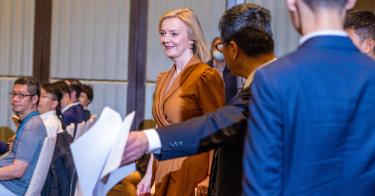“Your future is our future.”
That was the simple yet powerful message of former British Prime Minister Liz Truss to Taiwan.
Truss made a notable five-day trip to Taiwan starting on May 16, becoming the first former British prime minister to visit the self-governing island republic since Margaret Thatcher, who visited the nation in 1992.
In her address to Taiwan’s Prospect Foundation, Truss unambiguously pointed out:
The reason I’ve come here this week is I am a huge admirer of Taiwan and the Taiwanese people. I want to do all I can to help ensure your continued success. I want to increase awareness of the position that you find yourselves in. And I’m also here because I believe that this is the most consequential place in the world for what is the most consequential struggle of our time … Taiwan really is a shining beacon in the Pacific. It’s an enduring rebuke to totalitarianism. It’s an example of the power of free enterprise and it shows the importance of a free society.
As a matter of fact, the United Kingdom and Taiwan, along with the United States and other like-minded partners, have more in common than ever before. They share values related to democratic principles, free enterprise, and respect for the rule of law. Taiwan has proven to be a reliable and strong partner in advancing freedom, opportunity, and prosperity in the Indo-Pacific region and around the globe.
Taiwan’s economy is a model for Asia and beyond. Over the past 30 years, the nation has weathered a number of regional and global economic downturns resiliently and has emerged from these crises as competitive as ever.
Taiwan is the world’s fourth freest economy, recording its highest score ever in The Heritage Foundation’s 2023 Index of Economic Freedom, an annual cross-country study that assesses and compares economic policy environments of over 175 countries around the world. Taiwan has charted a remarkable degree of economic openness and entrepreneurial competitiveness over the years.
Taiwan’s economic and political transformations have been much more than domestic successes. They have fundamentally altered Taipei’s relationship with Washington and London, with other capitals around the world, and—perhaps most critically—with Beijing.
Taiwan stands as shining proof of what free people can achieve in a Chinese society. The island free-market democracy has demonstrated to the world that freedom is a stabilizing and transformative force; and that free enterprise, free association, free speech—the hallmarks of a flourish civil society—lead to entrepreneurship, prosperity, and security.
From a broader geopolitical perspective, Taiwan’s vibrant liberal capitalist democracy challenges the United States and other nations to reassess their policies toward Beijing. Ensuring American interests in the Indo-Pacific necessitates more than merely inspiring rhetoric and frequent meetings. It requires action and actionable policy ideas.
As Truss underscored during her remarks in Washington at The Heritage Foundation’s 2023 Margaret Thatcher Freedom Lecture in April about the role of the United States and the U.K., “Our strength is needed because we’ve got to ask ourselves after the success of winning the Cold War, ‘Why is it that authoritarians are on the march around the world?’”
She further noted, “We should be working with all of those allies to do all we can to support Taiwan now. And we need to put economic pressure on China before it’s too late.”
To that end, as explicitly recommended in a recent Heritage Foundation report, “Winning the New Cold War: A Plan for Countering China,” in addition to providing robust military support as required by the Taiwan Relations Act, the U.S. should deepen economic ties with Taiwan. That includes creating a free trade and investment agreement to help Taiwan gradually become less dependent on trade with China and to open more business opportunities for U.S. companies.
Partners with resolute willingness to work shoulder-to-shoulder are critical to winning any global fight, particularly when members of the free world are facing increasing challenges from authoritarian states. Nations sharing the values of freedom, a rock-solid commitment to preserving rules-based order, and a deep-seated desire to preserve and advance those democratic values are natural partners and allies for the U.S.
Taiwan has that resolute willingness. It is a shining, like-minded partner for America, Great Britain, and many others. Now is the time for Washington, London, and Taipei to work together toward further putting into action that enduring partnership.
This piece originally appeared in The Daily Signal




